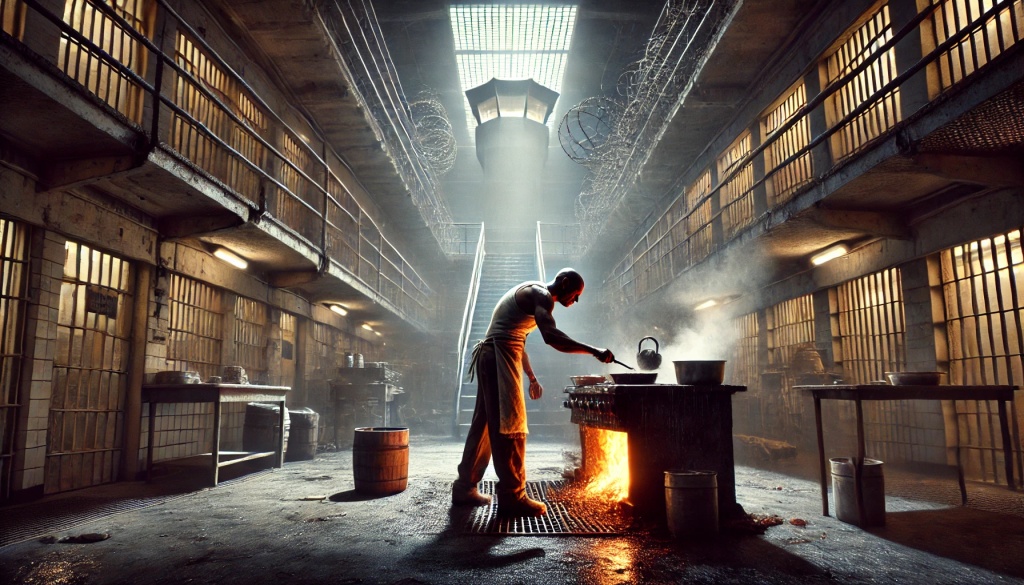The smell of eggs sizzling on the grill. The clattering of pots and pans. For most, these sounds evoke thoughts of a busy kitchen preparing meals. But for prisoners like Steven Warren and Richard Lilgerose, this scene represents years of forced labor under grueling conditions, earning just pennies an hour. For others, like California prison artist Donald “C-Note” Hooker, the consequences of refusing to participate in this labor can be just as severe.
Warren has been a cook at San Quentin State Prison for the past four years, working shifts that start at 3 a.m. and end at 8:30 a.m., preparing meals for 700 fellow inmates. “Between me and one other cook, we’re going to split the work to provide food on the grill for 700 people,” Warren shared. His pay? Cents on the dollar, leaving him with just $12 a month for hours of back-breaking work in the prison kitchen .
Lilgerose, who has been incarcerated for 20 years, described how the relentless demands of prison kitchen work took a mental toll on him. Suffering from PTSD, he found the kitchen’s chaotic environment exacerbated his anxiety. After continually asking for breaks, he was eventually removed from the kitchen but punished in other ways—moved to a unit with less access to the outdoors and phones and stripped of “good time,” which could affect his parole eligibility .
For C-Note, however, the story takes a different turn. In 2022, as a 60-year-old man, C-Note was assigned to work in a prison kitchen after a mass transfer of prisoners at his facility. He refused. “I was unwilling to give the remaining life force I have left on Earth to the State of California,” he stated, pointing out the injustice of being handed a Three Strikes life sentence for displaying a knife while defending himself from a homeless man on Skid Row. After 27 years without a parole hearing, he had no intention of becoming another cog in the prison labor machine .
C-Note’s refusal to work was not without consequences. He faced a politically charged environment where racial and social tensions ran high. Southern Hispanic prisoners were in conflict with an African American female supervisor, leading to a work strike and their eventual firing. Had he accepted the assignment, C-Note believed he would have been forced to choose sides, potentially leading to deeper racial divisions within the prison. His decision to resist participation in prison labor spared him this conflict, but it also resulted in a rules violation, which led to restrictions on his access to exercise, the day room, and phone privileges. His appeal eventually led to the violation being reduced to a counseling chrono, a disciplinary mark that could not be removed from his record, unlike a rules violation.
This counseling chrono would later disqualify him from participating in rehabilitation programs like Paws for Life, a dog training initiative for prisoners who maintain a clean disciplinary record for two years, and from a visual arts program. His story illustrates the complex and often punitive nature of resisting forced labor within the prison system, even when doing so is an act of personal preservation and political resistance.
The Prison Kitchen: A Hotbed of Exploitation
Prison kitchen jobs are notorious for being the most mentally and physically demanding. They involve long hours of manual labor, intense heat, and the constant threat of injury. Inmates, like Warren, work for just 19 cents an hour while facing dangerous conditions, such as the risk of burns from handling hot dishes. Worse, the labor politics among prisoners and their prison administrative work supervisors adds another layer of stress. Cooperation is essential, but when some prisoners don’t pull their weight, others are forced to pick up the slack, further straining relationships in an already volatile environment .
Despite the physical and mental toll, prisoners often have no choice but to work. Under current California law, forced labor is legal in prisons, a remnant of the 13th Amendment’s “exception clause” that allows involuntary servitude for convicted individuals. Proposition 6, on the upcoming ballot, seeks to change that.
The Promise of Prop. 6
Proposition 6 aims to eliminate involuntary servitude in California, including for those behind bars. If passed, the measure would allow incarcerated individuals to choose whether or not they want to work, ending the practice of forced labor in prisons. Advocates for prison reform see this as a critical step toward justice, as the current system exploits prisoners for cheap labor without adequately compensating them or providing meaningful rehabilitation .
However, not everyone is fully on board with Proposition 6, despite supporting its passage. Democratic Senator Steve Glazer of Contra Costa County is among those who are wary of the potential unintended consequences of the bill. While Glazer supports the measure, he was assured that if prisoners refuse to work, they could still be compelled to do “chores.” This assurance has led him to cautiously back the proposition, but he remains concerned about the potential legal fallout. He points to the experience in Colorado, where forced labor was officially banned, but prisoners still had to work. Glazer’s apprehension centers around the fear that California could face similar legal challenges if Proposition 6 passes .
A Glimmer of Hope for Prisoners
Despite these concerns, the stories of prisoners like Warren, Lilgerose, and C-Note highlight the urgent need for reform. Prison kitchen jobs, in particular, illustrate the harsh realities of forced labor: grueling hours, dangerous conditions, and the mental toll it takes on those forced to endure it. For those who suffer from PTSD or other mental health conditions, like Lilgerose, the environment can be overwhelming, pushing them to the brink of breakdown. For others, like C-Note, resistance to forced labor comes at a steep personal cost, excluding them from rehabilitation programs that could offer a pathway to betterment and, eventually, freedom.
For many incarcerated individuals, the pay is so low that even after years of work, they leave prison without any meaningful savings or skills to support themselves upon release. This is why many believe that passing Proposition 6 is a necessary step toward not only ending forced labor but also promoting true rehabilitation and preparation for life after incarceration.
As the debate around Proposition 6 continues, one thing is clear: the current system isn’t working. For prisoners like Warren, Lilgerose, and C-Note, the kitchen represents a battleground where they are exploited for their labor. The scars—both mental and physical—are undeniable, and the promise of Proposition 6 offers a glimmer of hope for a more just and equitable future.
Watch the Full Video Here
In this video, Minister King X and Rick O’Ree discuss the significance of Proposition 6 and its potential to transform the prison system in California. With firsthand insights from those directly affected, this conversation sheds light on the critical need for reform.
This post was originally published on this site be sure to check out more of their content.







